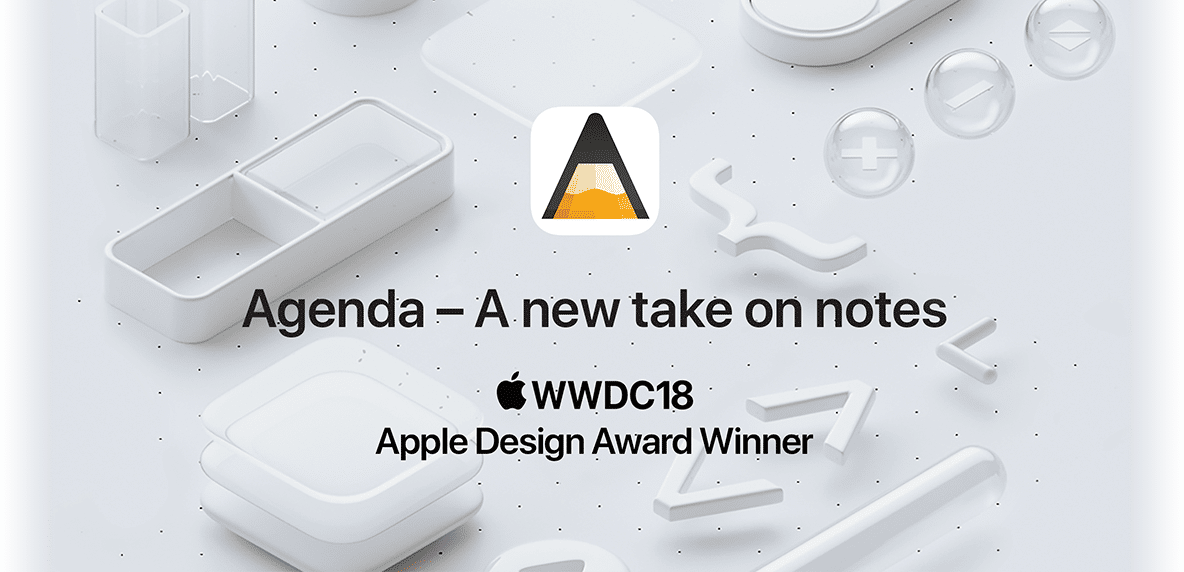Agenda App|開發者的一週年感言
閱讀成本 4 分鐘 #Agenda App2018 年 1 月 22 日 Agenda 初始版本(Agenda 1.0)正式上線,不久後我其實就有使用過一段時間。但也在很快的時間,就沒有繼續使用,直到去年把 Notion 拆解後,再度回到 Agenda,原因跟歷程可以參考之前的文章。
漸漸深入使用 Agenda 之後,發現其實開法者有一套自己的哲學,加上活躍的社群,我就想說固定來找一些有趣的社群文章,在這邊跟大家分享。
今天,就從 Agenda 的故事看起。(點此看原文)
Alexander Griekspoor(下稱 Alex) 是一個獨立的開發者,在 Agenda 出現之前,他有一個出名的作品 Papers,提供研究者收納以及整理參考資料使用。2016 年 Papers 被 Digital Science 收購,讓 Alex 除了扮演開發者外,更多了管理、營運的任務。
I noticed most people didn’t use any method like this, despite how simple it was. I started advising the people I saw struggling to do the same as I did and told them: “Just keep a TextEdit document open where during the week you capture the things you want to discuss with me. And when we have our 1-on-1 we can simply go over that list”. When it seemed to work for them as well, I started to slowly think of turning this methodology into an app. At the minimum I would have one customer: myself.
本來他習慣使用簡單的文字編輯軟體,如 TextEdit、SimpleNote 去進行任務的管理。逐漸建立起來的許多筆記心法與方法,讓充滿開發魂的他,思考如何把自己的心法與方法,變成一套的好的軟體,近一步的幫助任務管理、工作流程優化等等。
因此他找上了同是開發者的好友 Drew McCormack,討論要這個構思。第一時間 Drew 回應,是市面上已經太多筆記軟體了,對於開發一個新筆記軟體,既沒有市場,也不具有競爭力。
While his very first reaction was “another note taking app?! There are thousands of those already!”, he seemed to like the idea for this date-focused note taking app in the end.
經過一番討論,Alex 將 Agenda 定義為「以日期為核心的筆記軟體」,在這樣的基礎上,引起了 Drew 的興趣。
其後,開始進入了產品開發的時間,在進入正式的產品進程前的測試,他們從回饋中有一個重大的發現。
We received some very good feedback from a number of testers. However, when we say “very good”, it refers to the quality of the feedback; what was said about the app itself was actually quite bad. The testers did not understand the methodology, nor what all those boxes were supposed to mean, what determined their sort order, etc. After a year of work, that was a bitter pill to take to say the least…
還未上市前的 Agenda 設計上過於複雜,使用者第一時間很難抓到使用的邏輯。原本立意良善「方法工具化」的目標,並沒有在第一個版本達成。
在這些回饋之後,Alex 與 Drew 做了一個重大的決定:簡化 Agenda。慢慢的開發出了第一個上線的版本 Agenda 1.0。
故事說到這邊,Agenda 在推出之後,版面的簡潔跟美觀,我們會知道原來都是經過思考而來,也不難發現為什麼當討論區文章不斷丟出新的需求(wish list)的時候,兩人會持續堅持 date-focused note taking 的使用邏輯,而是不是改變方想去做出一個任務管理(task management)或者單純筆記工具。
很快的 Agenda 獲得了許多關注以及成功,正式推出一年內,創造了超過百萬人次的下載,也入選為編輯推薦以及獲得 WWDC18 的獎項。

WWDC18 Apple Design Winner
雖然推出的第一年就已經受到許多關注,但產品推出之後,才是真的開始。所有封測不會遇到的情況,更多使用者、不同語言國家的接觸,提供了更多的回饋以及改進建議。促使,Agenda 這兩年往更好的方向發展,版本推陳出新。
就像我之前提到的,中文的支援度以及速度,就是經過不斷優化,近一步增加了使用者的擴大。目前也持續有許多開發項目,不過令我最有感的是,Alex 與 Drew 並非把突出的需求照單全收,而是在核心價值之下,去做最有效的事情。
正如同 Alex 在另外一篇文章中所回應,很多人都在討論該使用哪種工具,哪種工具比較好,但其實更該專注在「流程」,而流程並不會被使用的工具所限制。
In a lot of the discussion I see a lot of focus on the tool, what A can do and B cannot, but B can and A cannot etc etc. I personally think we should focus much more on the process, which often can be done in any app. I wrote about it in my “Next Box” post; while I “live” in Agenda and love it as my tool of choice (duh!), the workflow I have today isn’t much different from the one I originally set up in TextEdit and Simplenote. Agenda makes it (much) nicer and adds a lot of power, but the basics are the same.
今天,Agenda 的上場的故事就先說到這邊,或許我們都該思考,我們到底想要建立哪種系統?創造如何的流程?運用 Alex 的核心觀念,悠遊於不同的 App 之中。
下次見!
如果您喜歡這篇文章,歡迎訂閱電子報,也請不吝留言鼓勵、討論或分享到自己的社群中,文章採用創用 CC 姓名標示-非商業性-相同方式分享 3.0 台灣 授權條款授權,分享、引用請依授權規定,並附上原文連結(按右鍵複製連結):Agenda App|開發者的一週年感言。